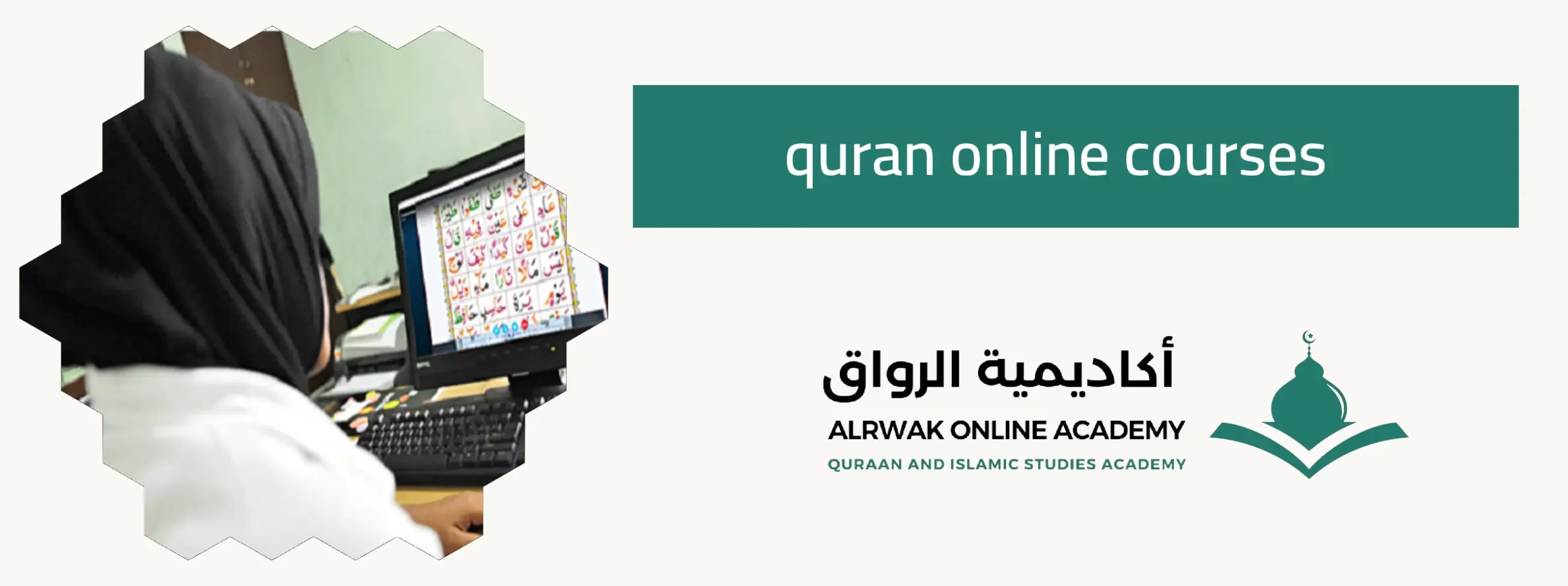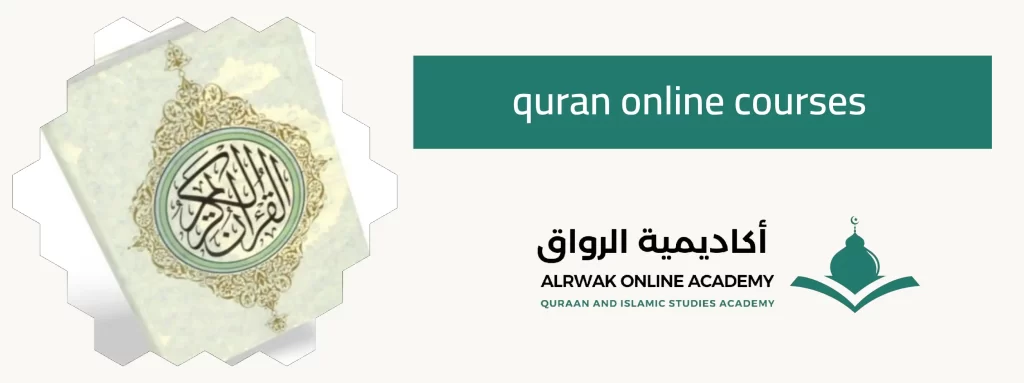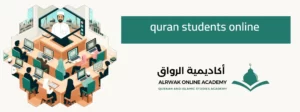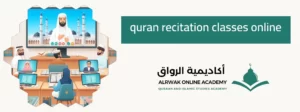In the digital age, education has transcended traditional boundaries, with the advent of online learning platforms offering a diverse range of subjects. Among these, quran online courses have gained prominence, providing an accessible and flexible avenue for individuals around the world to deepen their understanding of Islam’s holy scripture. In this article, we will explore the growing significance of Quran online courses, their benefits, challenges, and the impact they have on the global Muslim community.
The Need for quran online courses
As the world becomes more interconnected, the demand for accessible and flexible education options has grown exponentially. For Muslims seeking to enhance their knowledge of the quran online courses present a convenient solution. This is particularly true for individuals with busy schedules, limited access to traditional Islamic educational institutions, or those living in non-Muslim-majority countries.
Quran online courses cater to a diverse audience, ranging from beginners eager to learn the basics of recitation and understanding, to advanced students seeking in-depth knowledge of Quranic interpretation and memorization. The flexibility of online learning allows students to progress at their own pace, fitting their studies around work, family, and other commitments.
Benefits of quran online courses
- Accessibility: One of the primary advantages of quran online courses is accessibility. Individuals from any corner of the globe can access quality Quranic education without the constraints of geographical location. This is especially beneficial for those residing in areas with limited access to traditional Islamic schools or scholars.
- Flexible Learning: quran online courses provide flexibility in terms of scheduling. Students can choose the time and place that suits them best, enabling them to balance their religious studies with other responsibilities. This flexibility is crucial for working professionals, students, and parents who may find it challenging to commit to fixed schedules.
- Personalized Learning Experience: quran online courses often offer a personalized learning experience. Students can choose courses that align with their level of knowledge and specific areas of interest, whether it be Quranic recitation, memorization (Tajweed), or in-depth study of Quranic interpretation (Tafsir).
- Interactive Learning Tools: Many quran online courses incorporate interactive tools such as live sessions, forums, and quizzes to engage students actively. This interactivity enhances the learning experience, fostering a sense of community among online learners and providing opportunities for discussions and questions.
- Diverse Teaching Styles and Resources: Online Quran courses often feature a variety of instructors with diverse teaching styles. This ensures that students can find an approach that resonates with them. Additionally, the integration of multimedia resources, including video lectures, audio recitations, and interactive texts, enhances the learning process.
Challenges and Considerations
While Quran online courses offer numerous benefits, there are also challenges that both learners and educators must navigate.
- Quality Assurance: Ensuring the quality of Quran online courses can be challenging. With the proliferation of online platforms, there is a wide range of courses available, varying in terms of content quality, instructor qualifications, and authenticity. Students must exercise caution in selecting reputable courses from trusted institutions.
- Lack of Personal Interaction: Unlike traditional classrooms, online learning may lack the face-to-face interaction between students and teachers. This absence of direct communication can impact the depth of understanding and the ability to seek immediate clarification on complex topics.
- Technological Barriers: Some learners may face technological barriers, such as a lack of reliable internet access or the necessary devices. These challenges can hinder their ability to fully engage with online courses.
- Motivation and Discipline: Online learning requires a high level of self-motivation and discipline. Without the structure of a physical classroom, students may struggle to stay on track and complete their studies, especially if they are balancing multiple responsibilities.
Impact on the Global Muslim Community
The rise of Quran online courses has had a profound impact on the global Muslim community, influencing education, spirituality, and community engagement.
- Global Connectivity: quran online courses have facilitated global connectivity within the Muslim community. Students from diverse backgrounds and cultures can connect and share their experiences, fostering a sense of unity and understanding among Muslims worldwide.
- Empowering Women in Islamic Education: Online Quran courses have played a pivotal role in empowering Muslim women in their pursuit of Islamic education. With the flexibility afforded by online learning, women can overcome traditional barriers and engage in Quranic studies on their own terms.
- Reviving Interest in Quranic Studies: The accessibility and convenience of online Quran courses have contributed to a resurgence of interest in Quranic studies. Individuals who may have felt disconnected from traditional methods of learning now have the opportunity to explore and deepen their understanding of the Quran.
- Enhancing Religious Literacy: quran online courses contribute to the overall enhancement of religious literacy within the Muslim community. By providing accessible avenues for learning, these courses enable individuals to better understand and apply the teachings of the Quran in their daily lives.
more: quran courses online
The Digital Frontier of Islamic Education
In the contemporary landscape of education, the digital frontier has ushered in a transformative era for Islamic education, reshaping the traditional methods of learning and broadening the horizons of accessibility. This digital revolution has been particularly profound in the realm of Quranic education, where online courses have emerged as a powerful medium for disseminating the wisdom and teachings of the Islamic holy scripture. The shift toward quran online courses education represents a departure from conventional brick-and-mortar institutions, as it leverages technology to overcome geographical barriers and provides a flexible platform for learners worldwide.
The digital frontier’s impact on Islamic education is evident in the accessibility it affords to individuals from diverse backgrounds and geographical locations. Traditional barriers to Quranic learning, such as limited access to qualified teachers or proximity to Islamic educational institutions, have been dismantled by the advent of online courses. Muslims, whether residing in remote areas, non-Muslim-majority countries, or bustling urban centers, can now embark on a Quranic learning journey without the constraints of physical distance. This newfound accessibility has democratized Islamic education, making it inclusive and available to a global audience, fostering a sense of unity among Muslims worldwide.
The flexibility inherent in quran online courses marks a departure from the rigid schedules of traditional classrooms. Learners can tailor their Quranic education to suit their individual schedules, accommodating work commitments, familial responsibilities, and other life demands. This flexibility is especially crucial for those juggling multiple roles, such as working professionals, students, and parents. As a result, the digital frontier of Islamic education has empowered learners to pursue religious knowledge without compromising other aspects of their lives, providing a harmonious balance between faith and the demands of the modern world.
Within the realm of quran online courses, the concept of personalized learning has taken center stage. Students can choose courses that align with their proficiency levels, areas of interest, and specific learning goals. Whether seeking to master the art of Quranic recitation, delve into the intricacies of Tajweed (rules of Quranic pronunciation), or engage in a profound study of Tafsir (Quranic interpretation), learners can find tailored programs that cater to their unique educational needs. This personalized approach not only enhances the learning experience but also ensures that individuals can progress at their own pace, deepening their understanding of the Quran in a manner that suits their individual learning styles.
The integration of interactive tools has further enriched the digital Quranic learning experience. Online courses often incorporate live sessions, discussion forums, and multimedia resources such as video lectures and audio recitations. These tools foster a sense of community among online learners, providing opportunities for engagement, collaboration, and the exchange of ideas. The interactive nature of online Quran education goes beyond the one-way communication of traditional classrooms, creating a dynamic and participatory learning environment that resonates with the tech-savvy generation.
However, the digital frontier of Islamic education is not without its challenges. Quality assurance becomes a paramount concern as the proliferation of online platforms leads to a wide spectrum of courses with varying levels of content quality and instructor qualifications. Navigating this diverse landscape requires vigilance on the part of learners to select reputable courses from recognized institutions, ensuring a sound and authentic educational experience.
Additionally, the absence of face-to-face interaction in online learning can pose challenges. The direct communication between students and teachers that is integral to traditional classrooms may be limited in the digital realm. Overcoming this hurdle necessitates the implementation of effective communication channels, live sessions, and interactive elements that foster meaningful engagement and allow students to seek clarification on complex topics.
In conclusion, the digital frontier of Islamic education, particularly in the context of online Quran courses, has redefined how individuals access and engage with the teachings of the Quran. This transformative shift towards digital platforms has broken down barriers, providing unprecedented accessibility, flexibility, and personalized learning experiences. While challenges exist, the positive impact on the global Muslim community is undeniable, as the digital frontier continues to shape the future of Islamic education, paving the way for a more interconnected and informed generation of learners.

Benefits Beyond Boundaries: Accessible Quran Learning
The advent of quran online courses has ushered in a new era of accessibility, transcending geographical boundaries and providing unprecedented opportunities for individuals around the world to engage in Quranic learning. The benefits of these online courses extend far beyond traditional limitations, offering a transformative educational experience that is both inclusive and adaptable to the diverse needs of learners.
One of the primary advantages of quran online courses is the newfound accessibility it brings to individuals irrespective of their geographical location. In the past, limited access to qualified Quranic instructors or physical proximity to Islamic educational institutions posed significant challenges for those eager to deepen their understanding of the holy scripture. However, with the rise of online courses, these barriers have been dismantled, and a global audience now has the ability to embark on a Quranic learning journey from the comfort of their homes.
Accessibility is particularly crucial for Muslims residing in non-Muslim-majority countries, where the availability of traditional Islamic educational institutions may be scarce. Online Quran courses bridge this gap, providing a virtual classroom where individuals can access authentic Quranic teachings, connect with qualified instructors, and build a strong foundation in their faith. This accessibility is a powerful tool for fostering a sense of community and religious identity among Muslims living in diverse cultural contexts.
The flexibility inherent in online Quran learning further enhances its accessibility. Traditional educational models often require students to adhere to rigid schedules, making it challenging for individuals with busy lifestyles to commit to regular classes. Online Quran courses, on the other hand, empower learners to tailor their study routines according to their unique schedules. This flexibility is particularly beneficial for working professionals, students, parents, and anyone with time constraints, allowing them to harmonize their commitment to Quranic education with other life responsibilities.
Moreover, the flexibility of quran online courses extends to the variety of courses available, catering to learners at different levels of proficiency. Whether someone is a beginner seeking to learn the fundamentals of Quranic recitation or an advanced student aspiring to delve into the depths of Quranic interpretation (Tafsir), online platforms offer a diverse array of courses to cater to individual learning needs. This adaptability ensures that learners can progress at their own pace and delve into specific areas of Quranic knowledge that resonate with their interests.
The personalized learning experience offered by online Quran courses is another dimension of accessibility. Rather than adhering to a one-size-fits-all approach, learners can choose courses that align with their proficiency levels, learning styles, and specific goals. This personalized approach not only enhances the effectiveness of the learning process but also fosters a deeper connection between the student and the material, allowing for a more meaningful and impactful educational journey.
Interactive tools play a significant role in making online Quran learning an engaging and enriching experience. Live sessions, discussion forums, multimedia resources, and interactive texts provide avenues for students to actively participate in their learning. This interactive element goes beyond the passive consumption of information found in traditional classrooms, creating a dynamic and collaborative virtual learning environment.
In conclusion, the benefits of accessible Quran learning through online courses are multifaceted. The removal of geographical barriers, the flexibility of scheduling, the diversity of available courses, personalized learning experiences, and the integration of interactive tools collectively contribute to a transformative educational landscape. As technology continues to advance, the global Muslim community stands to gain even more from the accessibility and adaptability offered by online Quran courses, fostering a generation of individuals deeply connected to the teachings of the Quran, regardless of where they are in the world.
The Rise of Online Quran Education
The landscape of Islamic education is undergoing a profound transformation with the rise of online Quran education, ushering in a new era marked by flexibility in faith. As the digital realm intersects with religious learning, the traditional boundaries of time, space, and accessibility are dismantled, offering a dynamic and adaptable platform for individuals seeking to deepen their connection with the Quran.
Central to the paradigm shift is the newfound flexibility that online Quran education provides. Unlike the fixed schedules of brick-and-mortar institutions, online courses empower learners to navigate their faith journey on their own terms. This flexibility is particularly significant for individuals whose busy lives, work commitments, or familial responsibilities may have previously posed barriers to regular attendance in traditional classrooms. The virtual classroom, accessible from anywhere with an internet connection, accommodates the diverse schedules of students, fostering an environment where the pursuit of religious knowledge seamlessly integrates with the demands of modern life.
Flexibility in faith, as facilitated by online Quran education, extends beyond scheduling. It encompasses the diverse array of courses offered to cater to individuals at various points in their spiritual journey. Whether someone is a newcomer seeking to grasp the basics of Quranic recitation or a seasoned learner aspiring to delve into the complexities of Quranic interpretation, online platforms offer a plethora of courses to suit different proficiency levels and areas of interest. This adaptability ensures that learners can tailor their educational experience to align with their unique needs and aspirations, fostering a more personalized and engaging approach to the study of the Quran.
The virtual learning environment also lends itself to a more individualized and self-paced educational experience. Online Quran courses allow students to progress through the material at a speed that suits their learning style, ensuring a deeper understanding and retention of the content. This self-directed approach enhances the connection between the learner and the Quran, enabling a more profound engagement with the sacred text. It is a departure from the one-size-fits-all model, allowing individuals to explore the intricacies of the Quran at their own pace and on their own terms.
The intersection of faith and technology in online Quran education is further enriched by the interactive tools integrated into these courses. Live sessions, discussion forums, multimedia resources, and interactive texts create a dynamic and participatory learning environment. This interactivity not only engages the learner but also fosters a sense of community among online students, despite physical distances. The ability to engage in discussions, seek clarification from instructors, and collaborate with peers contributes to a holistic and enriched learning experience, making the journey of Quranic exploration both dynamic and socially connected.
However, as the digital frontier of Quran education unfolds, it is not without its challenges. The absence of face-to-face interaction may raise concerns about the depth of understanding and the ability to seek immediate clarification on complex topics. Striking a balance between the convenience of online learning and the importance of personal engagement is crucial for the continued success and effectiveness of these platforms.
In conclusion, the rise of online Quran education signifies not only a shift in the way individuals approach their faith but also a paradigmatic change in the accessibility and flexibility of religious learning. The merging of technology and religious education has opened doors for learners to seamlessly integrate their pursuit of Quranic knowledge with the complexities of modern life. This flexibility in faith, characterized by adaptable schedules, diverse course offerings, self-paced learning, and interactive tools, heralds a new era where individuals can embark on their Quranic journey with unprecedented freedom and connectivity, fostering a deeper and more meaningful engagement with the teachings of the Quran.
Quality Assurance in Online Quran Courses
Ensuring the quality of quran online courses is paramount in maintaining the integrity of Islamic education and meeting the expectations of learners seeking authentic and reliable sources of knowledge. The digital landscape, while providing unprecedented accessibility, also poses challenges related to content quality, instructor qualifications, and overall credibility. Quality assurance in online Quran courses is a multifaceted endeavor that involves careful consideration of several key factors.
One fundamental aspect of ensuring quality in quran online courses is verifying the authenticity of the content being offered. The Quran is a sacred text, and its interpretation and teachings must align with the principles of Islam. Reputable online courses adhere to recognized interpretations and methodologies, ensuring that the content is in accordance with established Islamic scholarship. Quality assurance mechanisms should involve a thorough review of the curriculum, ensuring it is accurate, comprehensive, and aligns with the accepted principles of Quranic interpretation (Tafsir).
In addition to content authenticity, the qualifications and credentials of instructors play a pivotal role in ensuring the quality of quran online courses. Instructors should have a solid foundation in Islamic studies, with expertise in Quranic sciences, Tajweed (rules of Quranic pronunciation), and other relevant fields. Transparent communication of instructors’ qualifications, experience, and scholarly credentials is essential for prospective students to make informed decisions about the credibility of the course.
Accreditation and recognition from reputable Islamic institutions further contribute to the quality assurance process. Online Quran courses affiliated with recognized educational bodies or institutions add a layer of validation to the program. Accreditation ensures that the course meets established standards and is subject to periodic evaluation, reinforcing its credibility within the broader framework of Islamic education.
Feedback and reviews from previous students are valuable indicators of the quality of an online Quran course. Testimonials and reviews provide insights into the effectiveness of the course, the instructor’s teaching style, and the overall learning experience. Prospective students can use this feedback to assess whether the course aligns with their learning objectives and expectations.
Live sessions and interactive elements within quran online courses contribute to quality assurance by providing opportunities for real-time engagement and clarification. Platforms that facilitate direct communication between students and instructors foster a sense of community and accountability. The ability to ask questions, seek guidance, and participate in discussions enhances the overall learning experience and ensures that students receive the necessary support for their educational journey.
Transparency in course structure, objectives, and assessment methods is integral to quality assurance. Clear communication about the expected outcomes, assessment criteria, and any prerequisites helps students make informed decisions about their readiness for the course. A well-defined curriculum with measurable learning objectives contributes to the overall effectiveness of the learning experience.
To further enhance quality assurance, ongoing evaluation and updates to the course content are essential. The dynamic nature of educational technology and Islamic scholarship necessitates periodic reviews and revisions to ensure that the course remains relevant, accurate, and aligned with evolving standards.
In conclusion, quality assurance in quran online courses is a comprehensive process that involves the validation of content authenticity, instructor qualifications, accreditation, student feedback, interactive elements, and transparent communication. As the digital landscape continues to evolve, maintaining the highest standards of quality in online Quran education is essential to preserving the sanctity of the Quranic teachings and providing a trustworthy and enriching learning experience for students worldwide.
Comparison between traditional learning and online learning
Memorizing the Quran is a sacred and revered practice in Islamic education, and the methods employed have evolved over time to embrace both traditional and online learning approaches. A comparison between traditional and online Quranic memorization processes reveals distinct differences in methodology, accessibility, and the overall learning experience.
Traditional Learning:
- In-Person Interaction: Traditional Quranic memorization typically involves face-to-face interaction with a qualified teacher in a physical classroom setting. Students sit closely with their teacher, fostering a personal and direct connection that goes beyond the academic aspect of memorization.
- Oral Recitation Emphasis: The traditional approach places a significant emphasis on oral recitation. Students not only memorize the verses but also recite them aloud to the teacher, who corrects pronunciation (Tajweed) and provides immediate feedback. This oral component aids in the proper understanding and application of Quranic rules.
- Structured Learning Environment: Traditional memorization often occurs in a structured environment, such as a mosque or an Islamic school. This environment promotes discipline, regularity, and a sense of community among students, creating a supportive atmosphere for the memorization journey.
- Personalized Attention: The one-on-one or small group setting in traditional learning allows for personalized attention from the teacher. Students receive individualized guidance based on their progress, strengths, and areas that need improvement, contributing to a tailored and effective learning experience.
Online Learning:
- Geographical Flexibility: Online Quranic memorization offers unparalleled geographical flexibility. Students can connect with qualified teachers regardless of their physical location, overcoming barriers related to distance or the availability of local instructors.
- Virtual Interaction: Online learning relies on virtual platforms, where students interact with teachers through video calls and digital communication tools. While this lacks the immediate physical presence, it opens up possibilities for global connectivity and enables students to learn from skilled instructors worldwide.
- Self-Paced Learning: Online memorization programs often provide a self-paced learning environment. Students have the flexibility to set their own schedules, accommodating work, school, or family commitments. This adaptability is particularly beneficial for individuals with busy lifestyles.
- Multimedia Resources: Online Quranic memorization is enriched with multimedia resources. Students can access audio recordings, video lessons, and interactive materials that complement the learning process. These resources enhance the understanding of pronunciation, rhythm, and the overall cadence of the Quranic verses.
- Group or Individual Sessions: While some online platforms offer one-on-one sessions, others provide group classes. Group settings create a sense of virtual community, allowing students to engage with peers from diverse backgrounds. Conversely, individual sessions allow for focused attention and personalized guidance.
Common Aspects:
- Emphasis on Correct Pronunciation: Both traditional and online Quranic memorization place a strong emphasis on correct pronunciation (Tajweed). Whether in person or through virtual platforms, instructors aim to ensure that students recite the Quranic verses accurately.
- Spiritual Guidance: Both approaches incorporate spiritual guidance, acknowledging the sacred nature of Quranic memorization. Teachers often provide moral and spiritual support, fostering a holistic approach to the memorization journey.
- Regular Assessment: Assessment is a fundamental aspect of both traditional and online Quranic memorization. Instructors evaluate students regularly to track progress, identify areas for improvement, and ensure a thorough understanding of the memorized verses.
In conclusion, the emergence of quran online courses marks a significant milestone in the ever-evolving landscape of Islamic education. The digital frontier has not only broken down geographical barriers but has also provided unprecedented access to the timeless wisdom of the Quran for individuals around the world. As we navigate the realms of accessibility, flexibility, and quality assurance in online Quranic learning, it becomes evident that technology, when harnessed thoughtfully, can be a powerful tool for nurturing spiritual growth and understanding.
quran online courses offer a pathway for individuals with diverse backgrounds, lifestyles, and responsibilities to engage deeply with the sacred text. The flexibility of scheduling, personalized learning experiences, and the incorporation of interactive tools contribute to a dynamic and enriched educational journey. These courses empower learners to harmonize their faith with the demands of contemporary life, fostering a sense of unity within the global Muslim community.
While the benefits are abundant, it is crucial to address challenges such as quality assurance, the absence of face-to-face interaction, and technological barriers. Vigilance in selecting reputable courses, innovative approaches to virtual engagement, and efforts to bridge the digital divide will play pivotal roles in enhancing the effectiveness and inclusivity of online Quranic education.
As we look to the future, the fusion of technology and Islamic education holds the promise of even more innovative and effective approaches to Quranic learning. The digital platforms that connect students with knowledgeable instructors, foster virtual communities, and provide multimedia resources exemplify the potential of technology to enrich the spiritual and intellectual lives of individuals within the Muslim community.
In this digital age, quran online courses stand as beacons of accessible, flexible, and quality-focused educational avenues, inviting learners to embark on a journey of understanding, reflection, and connection with the divine wisdom encapsulated in the words of the Quran. The continuous evolution of online Quranic education promises to play a vital role in nurturing a global community of individuals committed to the pursuit of knowledge, spiritual growth, and the living essence of the Quran in their lives.




